about the game
DEEP IS A MEDITATIVE VR GAME CONTROLLED BY BREATHING
A custom controller measures diaphragm expansion in order to sense deep breathing. This information is fed back to the player in a variety of visual cues, intimately linking their consciousness and breath.
The environment's layout gently encourages the player to slow their breath, to sink deeper and relax. It can be played for therapeutic or aesthetic reasons, and does not require the use of arms, legs or hands.


-
“(Deep) was calming, and I began to experience the sense of peace I brushed against in my other experiments in meditation ... for me, for a few minutes, it worked.”
Ben Kuchera - Polygon
Related Publications
-
Visualization, Self-Efficacy, and Locus of Control in a Virtual Reality Biofeedback Video Game for Anxiety Regulation
Weerdmeester, J., van Rooij, M. M. J.W., & Granic, I. (2022). Visualization, Self-Efficacy, and Locus of Control in a Virtual Reality Biofeedback Video Game for Anxiety Regulation. Cyberpsychology, Behavior, and Social Networking, 25 (6).doi: 10.1089/cyber.2022.0030
Author: Joanneke Weerdmeester
Upload date: 06-10-2022
-
Take a DEEP Breath: Exploring the Potential of Game-based Biofeedback Interventions for Anxiety Regulations [Doctoral Dissertation]
J.W. Weerdmeester (2021). Take a DEEP Breath: Exploring the Potential of Game-based Biofeedback Interventions for Anxiety Regulations. Doctoral Thesis. Radboud University.
Author: Joanneke Weerdmeester
Upload date: 11-21-2021
-
A Randomized Controlled Trial Assessing the Efficacy of a Virtual Reality Biofeedback Video Game: Anxiety Outcomes and Appraisal Processes
Weerdmeester, J., van Rooij, M. M.J.W., Maciejewski, D. F., Engels, R. C.M.E, & Granic, I. (2021). A Randomized Controlled Trial Assessing the Efficacy of a Virtual Reality Biofeedback Video Game: Anxiety Outcomes and Appraisal Processes. Technology, Mind, and Behavior. doi: 10.1037/tmb0000028
Author: Joanneke Weerdmeester
Upload date: 08-05-2021
-
An Integrative Model for the Effectiveness of Biofeedback Interventions for Anxiety Regulation: Viewpoint
Weerdmeester, J., van Rooij, M. M., Engels, R. C., & Granic, I. (2020). Journal of Medical Internet Research, 22(7), e14958.
Author: Joanneke Weerdmeester
Upload date: 07-23-2020
-
Efficacy of a Virtual Reality Biofeedback Game (DEEP) to Reduce Anxiety and Disruptive Classroom Behavior: Single-Case Study
Bossenbroek, R., Wols, A., Weerdmeester, J., Lichtwarck-Aschoff, A., Granic, I., & van Rooij, M. (2020). JMIR Mental Health, 7(3), e16066. http://dx.doi.org/10.2196/16066
Author: Aniek Wols
Upload date: 03-24-2020
-
Exploring the Role of Self-efficacy in Biofeedback Video Games
Weerdmeester, J., van Rooij, M., Harris, O., Smit, N., Engels, R. C., & Granic, I. (2017, October). In Extended Abstracts Publication of the Annual Symposium on Computer-Human Interaction in Play (pp. 453-461). ACM.
Author: Joanneke Weerdmeester
Upload date: 10-15-2017
-
Current Opportunities in Research and Development of Games for Mental Health
Tuijnman, A. & Weerdmeester, J. (2017). CHI PLAY, October 15 - 18, 2017, Amsterdam.
Author: Anouk Tuijnman
Upload date: 10-15-2017
-
DEEP: A Biofeedback Virtual Reality Game for Children At-risk for Anxiety
van Rooij, M., Lobel, A., Harris, O., Smit, N., & Granic, I. (2016). CHI'16 Extended Abstracts, May 07-12, 2016, San Jose, CA, USA
Author: Marieke van Rooij
Upload date: 05-07-2016
Related updates
-
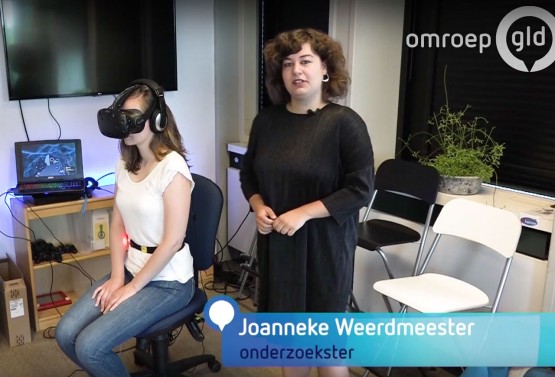
DEEP research featured in Omroep Gelderland about applied games
Joanneke Weerdmeester - 22-08-2017Joanneke Weerdmeester's PhD research on DEEP was featured in Omroep Gelderland (with subtitles)
-
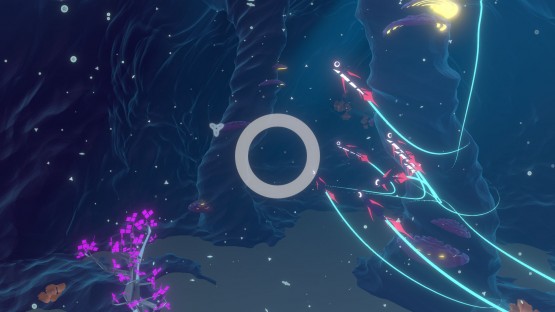
DEEP selected for INDIGO 2017 showcase
Joanneke Weerdmeester - 02-06-2017GEMH-lab will be at INDIGO 2017 to showcase the amazing VR game DEEP, so come and say hi!
-
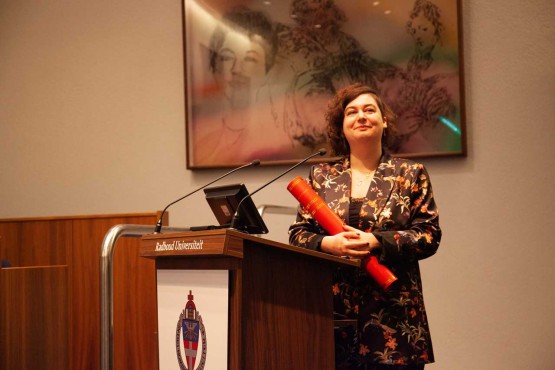
Quest Complete: Joanneke Weerdmeester successfully defended her doctoral thesis!
Joanneke Weerdmeester - 08-12-2021On November 21st, 2021 GEMH Lab's own Joanneke publicly defended her thesis entitled: "Take a DEEP Breath: Exploring the Potential of Game-based Biofeedback Interventions for Anxiety Regulation". In this blog you can find a link to her doctoral thesis as well as a link to the recorded livestream of the defense.
-

DEEP research featured in Omroep Gelderland about applied games
Joanneke Weerdmeester - 22-08-2017Joanneke Weerdmeester's PhD research on DEEP was featured in Omroep Gelderland (with subtitles)
-
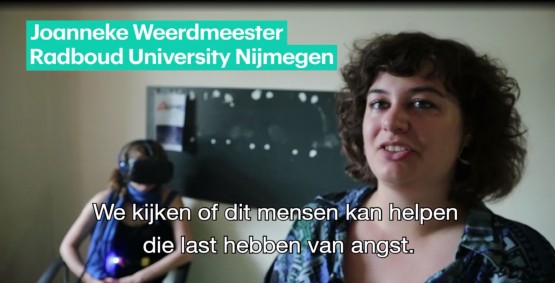
DEEP featured on RTL Z
Joanneke Weerdmeester - 07-07-2017RTL Z shortly stopped by our booth at INDIGO where we were showing DEEP, which resulted in a brief feature on the Dutch news of 17:30 on July 6th, 2017
-

DEEP selected for INDIGO 2017 showcase
Joanneke Weerdmeester - 02-06-2017GEMH-lab will be at INDIGO 2017 to showcase the amazing VR game DEEP, so come and say hi!
-
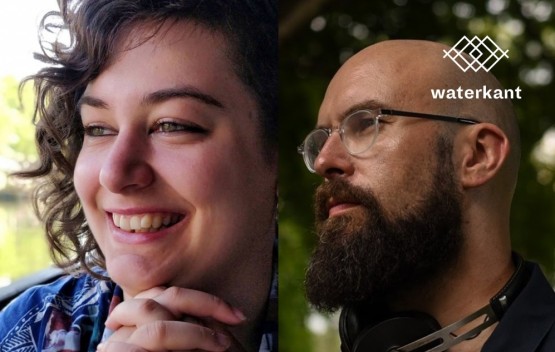
Talk: A Playful Approach to Solving Serious Problems - Waterkant 2020
Joanneke Weerdmeester - 26-08-2020During the online edition of the Waterkant Festival, Joanneke Weerdmeester (GEMH Lab) & Owen Harris (Explore DEEP) gave a joint talk on using interactive technology such as games and VR to improve our well-being. Check it out!
-
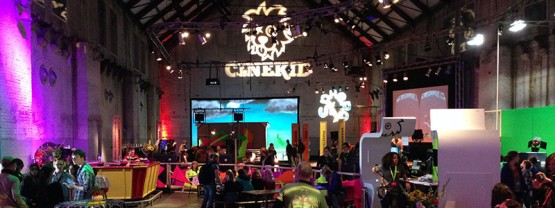
DEEP De-Briefing: Lessons for Collecting Data out in the Field
Adam Lobel - 31-10-2015Last week, my colleague Marieke van Rooij and myself ran and managed a study in the midst of Cinekid’s Medialab. This project turned out to be more ambitious than we had anticipated, but I think we pulled it off quite well. That said, I think a moment of reflection is warranted to go over all the choices and good fortune which facilitated our project’s success. All the materials mentioned here are available for download.
-
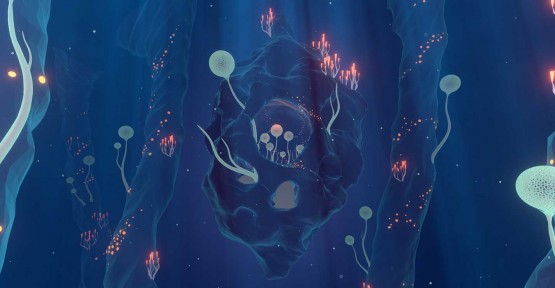
WSJ feature: Potential of Game-based Biofeedback Interventions
Joanneke Weerdmeester - 19-06-2020On June 8th our research with DEEP was featured in a great article in the Wallstreet Journal which discussed the promise of combining wearable biosensors with virtual reality and game design to create a new wave of more engaging and potentially more affordable and accessible forms of biofeedback training. In this blog we shortly outline our research with DEEP as well as other biofeedback video games.
-
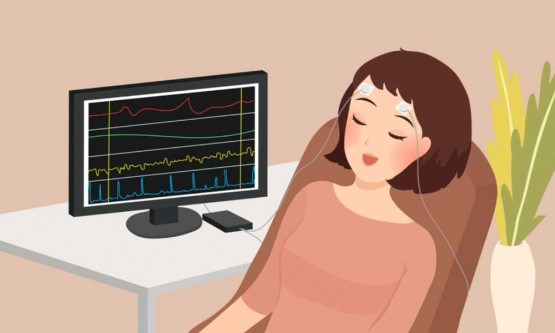
New paper: Theoretical Model and Suggestions for a New Phase of Biofeedback Research and Implementation
Joanneke Weerdmeester - 04-09-2020Our new open access viewpoint paper "An Integrative Model for the Effectiveness of Biofeedback Interventions for Anxiety Regulation" is online! With this paper we aimed to encourage a new phase of biofeedback research and implementation
-

Interview about DEEP research on local broadcast RN7
Joanneke Weerdmeester - 02-11-2020GEMH Lab's Joanneke Weerdmeester was interviewed by the local radio RN7 to talk about her research with DEEP
-
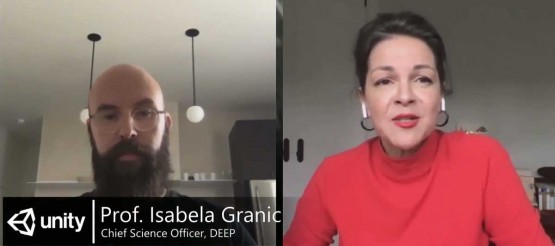
Unity for Humanity Summit | Merging Art and Science in the Meditative VR Game DEEP
Joanneke Weerdmeester - 02-11-2020Prof dr. Isabela Granic and Owen Harris (DEEP director) spoke at the Unity for Humanity summit about how the VR biofeedback game DEEP merges art and science to soothe players’ anxiety. Watch the 10-min video where Isabel and Owen outline the design and research of DEEP.
-
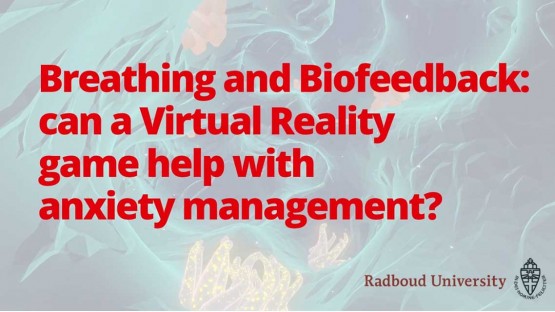
Video: "Breathing and Biofeedback: Can a VR game help with anxiety management?"
Joanneke Weerdmeester - 09-02-2022The Radboud University featured a short video where Dr. Joanneke Weerdmeester talks about her doctoral research around biofeedback games and anxiety regulation.
-
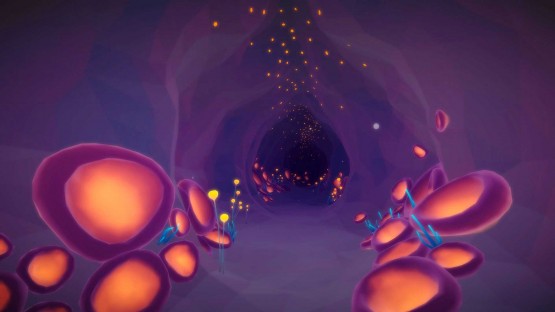
NRC Newspaper Article "A game that teaches you how to breathe when anxious"
GEMH Lab - 08-03-2022Dr. Joanneke Weerdmeester and game designer Niki Smit were interviewed by national Dutch newspaper NRC to talk about the development and research behind DEEP; a VR biofeedback game designed to help alleviate anxiety. The interview was featured in 2-page spread in the physical newspaper as well as in an online article.
-

Quest Complete: Joanneke Weerdmeester successfully defended her doctoral thesis!
Joanneke Weerdmeester - 08-12-2021On November 21st, 2021 GEMH Lab's own Joanneke publicly defended her thesis entitled: "Take a DEEP Breath: Exploring the Potential of Game-based Biofeedback Interventions for Anxiety Regulation". In this blog you can find a link to her doctoral thesis as well as a link to the recorded livestream of the defense.
-
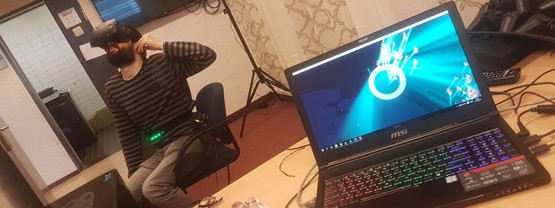
DEEP Diving into Virtual Reality
Isabela Granic - 04-06-2016Imagine you could snap your fingers and immediately be transported to a beautiful, serene world that responds to your stress with soothing resonance.
-

The Moment it "Clicks"
Joanneke Weerdmeester - 13-05-2019One of the coolest things about observing people when they play a game, especially when you get to observe them for an extended period of time, is witnessing the moment when someone becomes truly immersed in the game environment, when they truly connect with it, when something just 'clicks'...
-
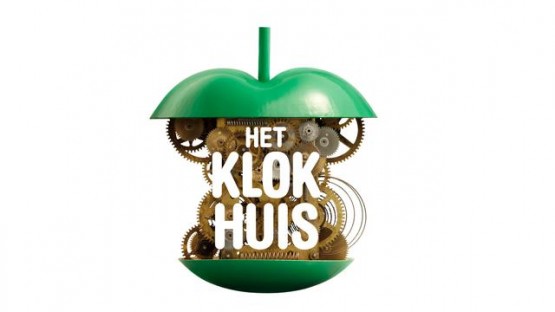
DEEP research nominated for the Klokhuis Science Prize 2020 - VOTE NOW!
Joanneke Weerdmeester - 16-10-2020Our research on the efficacy of the game DEEP has been nominated for the Klokhuis Science prize 2020! Klokhuis is a well-known educational TV show for children in the Netherlands and the winner will be featured in one of their episodes. Votes are open until November 13th. Please vote for us!
-
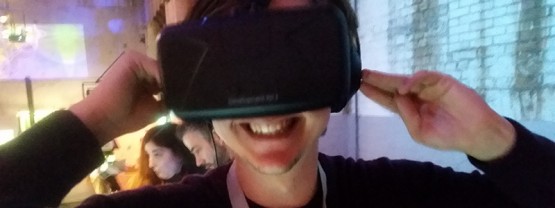
Faces of DEEP
Adam Lobel - 31-10-2015Just a collection of shots I took of people playing DEEP.

made by
Owen Harris & Niki Smit
Owen Harris is a game designer, VR designer and lover of all things playful. When not working on DEEP, he designs games and VR experiences for the University of Cambridge, Cancer Research UK, Gambrinous and others.
Niki Smit is co-founder of Monobanda PLAY, a Utrecht based game company that develops playful interactive experiences. He is a game designer and artist.


















